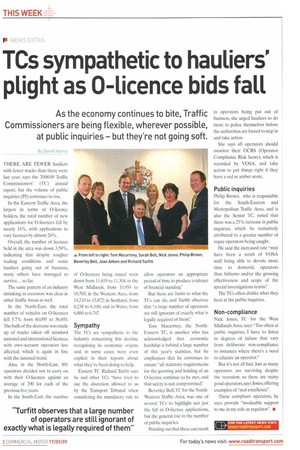TCs sympathetic to hauliers' plight as 0-licence bids fall
Page 10

If you've noticed an error in this article please click here to report it so we can fix it.
As the economy continues to bite, Traffic Commissioners are being flexible, wherever possible, at public inquiries but they're not going soft.
THERE ARE FEWER hauliers with fewer trucks than there were last year. says the 2008/09 Traffic Commissioners' (TC) annual report, but the volume of public inquiries (PI) continues to rise.
In the Eastern Traffic Area, the largest in terms of 0-licence holders, the total number of new applications for 0-licences fell by nearly 14%, with applications to vary licences by almost 20%.
Overall, the number of licences held in the area was down 3.59%, indicating that despite tougher trading conditions and some hauliers going out of business, many others have managed to survive.., so far.
The same pattern of an industry shrinking in recession was clear in other Traffic Areas as well.
In the North-East, the total number of vehicles on 0-licences fell 5.7% from 60,095 to 56,693. The bulk of the decrease was made up of trucks taken off standard national and international licences, with own-account operators less affected, which is again in line with the national trend.
Also, in the North-East, 891 operators decided not to carry on with their 0-licences against an average of 290 for each of the previous five years.
In the South-East, the number of 0-licences being issued went down from 11,619 to 11,304; in the West Midlands, from 10,958 to 10,703; in the Western Area, from 14,210 to 13,872; in Scotland, from 8,238 to 8,100; and in Wales, from 6,860 to 6.747
Sympathy
The TCs are sympathetic to the industry concerning this decline, recognising its economic origins, and, in some cases, were even explicit in their reports about what they've been doing to help.
Eastern TC Richard Turfitt says he and other TCs "have tried to use the discretion allowed to us by the Transport Tribunal when considering the mandatory rule to allow operators an appropriate period of time to produce evidence of financial standing'.
But there are limits to what the TCs can do, and Turfitt observes that "a large number of operators are still ignorant of exactly what is legally required of them" Tom Macartney, the NorthEastern TC, is another who has acknowledged that economic hardship is behind a large number of this year's statistics, but he emphasises that he continues to ensure "all statutory requirements for the granting and holding of an 0-licence continue to be met, and that safety is not compromised': Beverley Bell,TC for the NorthWestern Traffic Area, was one of several TCs to highlight not just the fall in 0-licence applications, but the general rise in the number of public inquiries.
Pointing out that these can result in operators being put out of business, she urged hauliers to do more to police themselves before the authorities are forced to step in and take action.
She says all operators should monitor their OCRS (Operator Compliance Risk Score), which is recorded by VOSA, and take action to put things right if they have a red or amber score.
Public inquiries
Philip Brown, who is responsible for the South-Eastern and Metropolitan Traffic Area, and is also the Senior TC, noted that there was a 25% increase in public inquiries, which he tentatively attributed to a greater number of rogue operators being caught.
He said the increased rate -may have been a result of VOSA staff being able to devote more time to domestic operators than hitherto and/or the growing effectiveness and scope of the special investigations teams':
The TCs often dislike what they hear at the public inquiries.
Non-compliance
Nick Jones, TC for the West Midlands Area, says: "Too often at public inquiries, I have to listen to degrees of failure that vary from deliberate non-compliance to instances where there's a need to educate an operator."
But it's not all bad. Just as many operators are surviving despite the recession, so there are many good operators, says Jones, offering examples of -real excellence.'
These compliant operators, he says, provide "invaluable support to me in my role as regulator'. • FR, FOR THE LATEST NEWS VISIT:








































































































































